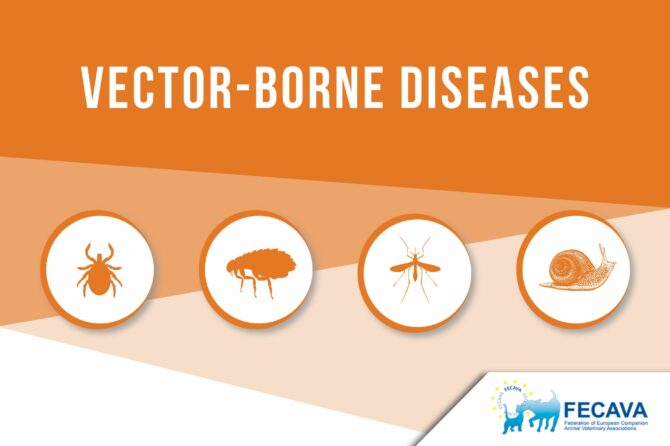
Vector-borne diseases
Vector-borne diseases (illnesses caused by parasites, viruses and bacteria transmitted by arthropod vectors) comprise a significant part of cases treated by veterinarians in certain parts of Europe. These diseases are often characterized by long incubation or subclinical periods, have variable clinical signs, which may be nonspecific, unpredictable transmission patters, persisting infection and significant zoonotic potential.
Distribution of vector-borne diseases (VBD) is associated with many demographic, environmental and social factors. Climate changes, urban expansion, increasing pet travel during months of high vector activity, varying stray animal populations influence the epidemiology of vector-borne diseases in European countries. Thus, diseases once considered rare might increase in frequency in certain parts of the continent as the result of relocation of infected animals or spread of infective agents and their vectors.
Diagnosis, treatment, prevention and control of VBD requires a thorough knowledge of the infectious agents, their vectors and major hosts. With early diagnosis, several of these diseases can be treated effectively and managed satisfactorily on a long-term basis. It essential for veterinarians to use all available means to prevent transmission of infectious agents to pets and causing disease.
The FECAVA working group on Canine Vector-Borne Diseases has produced a series of 2-page factsheets for practitioners, in collaboration with the European Scientific Counsel Companion Animal Parasites (ESCCAP) and European Society of Dirofilariosis and Angiostrongylosis (ESDA). The preparation of these factsheets has focused on providing practical, ready-to-access, updated guidance to veterinarians so that they can effectively diagnose and treat clinical cases and manage vector control by applying preventive strategies. The factsheets can serve as a quick reference guide for everyday use and be useful to all veterinarians irrespective of their clinical experience with VBD.
We hope that you will find the factsheets useful and consult them regularly in your daily practice.
Zoe Polizopoulou
EBVS European Specialist in Veterinary Clinical Pathology
FECAVA Working Group on Vector-Borne Diseases

"Thank you for this insightful article! Your well-researched content truly adds value to the health conversation. As someone passionate about promoting wellness, I appreciate the depth of information shared here. If you’re open to it, I’d love to contribute to this dialogue. Check out my thoughts on at same topic on my blog at https://pharmacopathy.com/ , and let’s continue this important conversation together!"
Reply